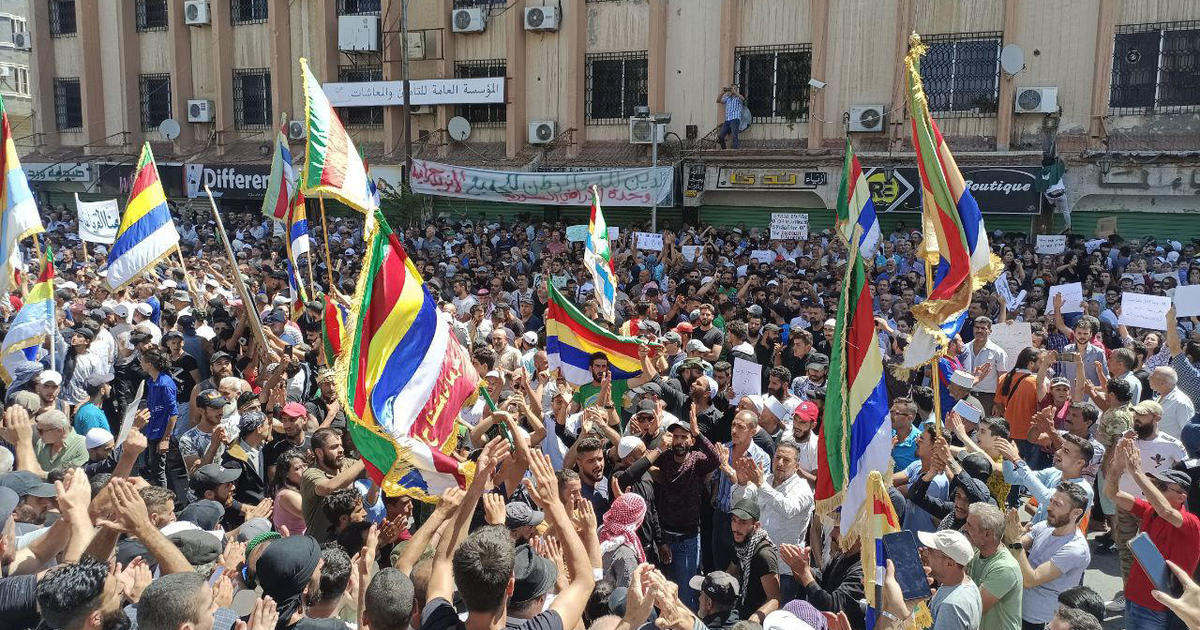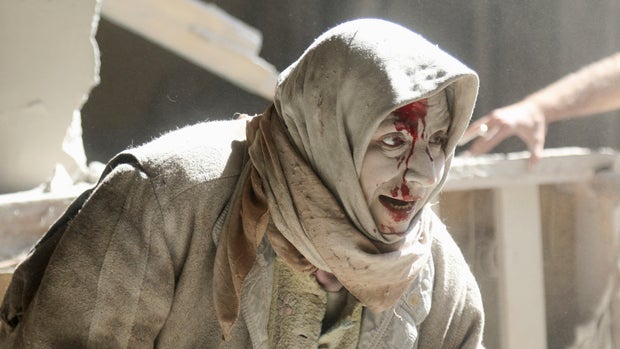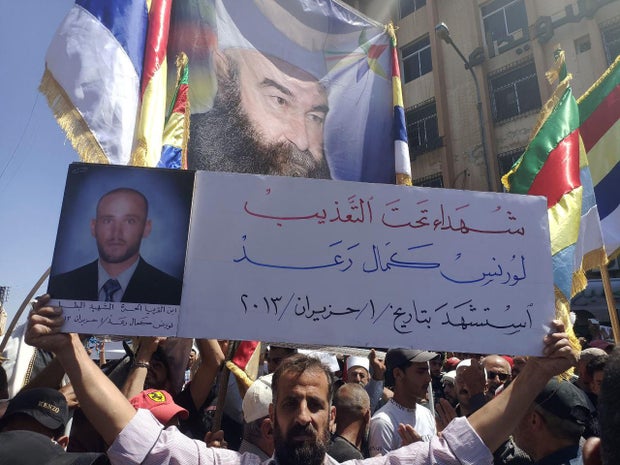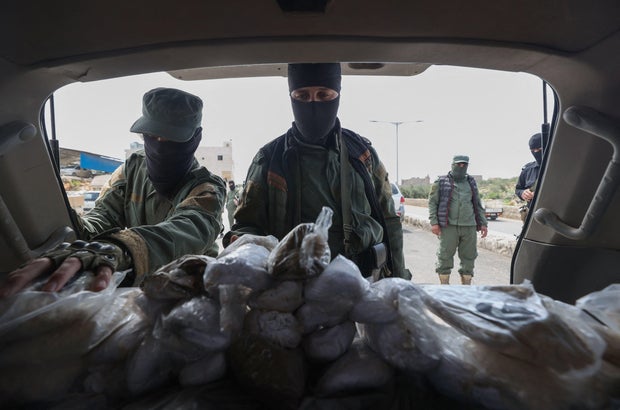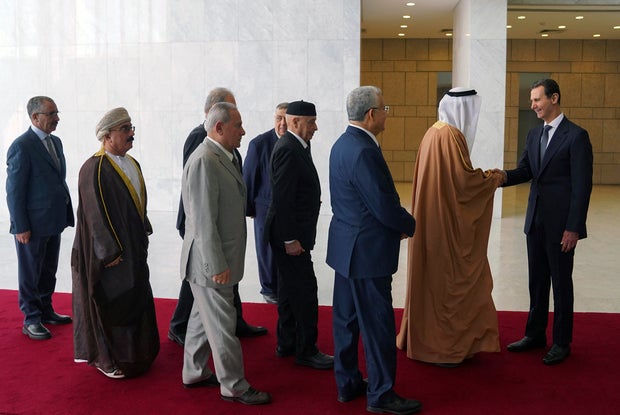Anti-government protests have been gaining steam in Syria for more than a month, echoing the demonstrations that President Bashar Assad sent his security forces to crack down on in 2011, sending the country into a downward spiral that morphed into a full-scale civil war.
The demonstrations, focused predominantly in the southern city of Suwayda, were initially driven by a deepening cost of living crisis — Syria’s economy has been crippled by years of war and is straining under the weight of myriad international sanctions. But anger over the crumbling economy has evolved quickly into demands for the downfall of the Assad government.
What’s behind the latest protests?
The demonstrations in Suwayda and nearby Deraa — where the 2011 uprising began — started after Assad’s government reduced fuel subsidies and raised gasoline prices by nearly 250% in August.
Assad doubled already-meager public sector wages and pensions, but the efforts to mitigate public anger did little to cushion the economic blow. Instead, the move accelerated inflation and further weakened the Syrian pound. Millions of Syrians who were already living in poverty after more than a decade of war found themselves even worse off.
The government insists the country’s economic trouble is the result of the sanctions imposed by the U.S. and its European allies since the war broke out.
The Druze, and the Assad government’s response
Three protesters were wounded in Suwayda on Sept. 13, when armed individuals opened fire as the demonstrators attempted to shut down a branch of the ruling Baath party. The shooters went unidentified, but reports said they were plain-clothes security forces. It was the first time that shots were fired at protesters during the recent demonstrations.
Leys El-Cebel/Anadolu Agency/Getty
Overall, however, the government’s response to the loud but non-violent demonstrations in Suwayda has been restrained.
The city is the heartland of the Druze religious minority in southwest Syria, and Assad has appeared reluctant to wield overwhelming force against the group. During the civil war, the government has presented itself as a defender of religious minorities against “Islamist extremism.”
In 2010, the last year before the initial Syrian revolt, Druze made up 3% of the country’s 22 million people. Members of the community, which is concentrated in Suwayda and in the Damascus suburb of Jaramana, are generally well-educated, and it is one of the most secular groups within Syrian society. They are also a transnational minority, with a presence in Lebanon, Jordan and Israel.
After the 2011 revolt, the Druze remained largely on the sidelines of the civil war, though many young men from the community refused to be conscripted in the Syrian military. Now, at least one powerful figure within the community is advocating for resistance to central than neutrality
U.S. outreach to the Druze, and Captagon in Suwayda
Sheikh Hikmat al-Hijiri, the most influential of the so-called Sheikh al-Aql (Sheikhs of Reason) who lead the Druze community in Syria, has called for the establishment of a new democratic state and rejected the Syrian national government’s control over the region.
U.S. Rep. French Hill, a Republican from Arkansas, paid a brief visit to a rebel-held part of northwest Syria last month. Hill joined two other U.S. lawmakers for the trip, which was the first known visit to the war-torn country by American politicians in six years.
After his visit, Hill held a video call with Sheikh Hijiri, “to learn first-hand about the experiences of the Syrians living in Suwayda.”
Leys El-Cebel/Anadolu Agency/Getty
The congressman told CBS News they’d “discussed the frustrations of the local people and their peaceful protests,” and that Hijiri had informed him that Syrian government forces were “cutting off access to water and electricity” in the city. The sheikh also accused the Assad government and “Iranian militia operators” allied with it of trafficking the illegal drug Captagon in the area.
The Biden administration, in conjunction with the U.K., sanctioned several members of Assad’s own family in March for “facilitating the export of Captagon,” with the U.S. Treasury saying the sanctions package, “underscores the al-Assad family dominance of illicit Captagon trafficking and its funding for the oppressive Syrian regime.”
OMAR HAJ KADOUR/AFP/Getty
Maher Sharafeddine, a Druze writer, journalist and opposition activist from Suwayda, told CBS News that Hill had made it clear to Hijiri that he hoped relations between the U.S. and the local Druze community would deepen, and Sharafeddine hoped the initial contact could signal new support in Washington for the opposition in Syria’s civil war.
Assad welcomed back by his neighbors
Assad has held on to power through the war thanks in large part to the armed assistance of his allies in Russia and Iran. But the conflict has splintered the country, left at least 300,000 civilians dead and displaced half of Syria’s pre-war population of 23 million.
The protests in Suwayda have rattled the Syrian government, but they don’t seem to pose an existential threat. Government forces have consolidated their control over most of the country and, after years spent fighting demonization for alleged war crimes against his own people, Assad has very literally retaken his seat at the table.
Other Middle Eastern leaders have been restoring relations with the Assad government, arguing that engagement is the best way to address the flow of refugees and illegal drugs across Syria’s borders.
SANA via AP
The 22-member Arab League, which cut ties with Syria early in the war, recently reinstated Syria as a member and, for the first time in more than a decade, Assad joined the bloc’s other leaders as they met in May.
The Biden administration, however, has indicated no softening of its stance on the heavily-sanctioned Assad government.
“We don’t support normalization of relations with the Assad regime,” U.S. State Department spokesman Ned Price said bluntly in March as the U.S. worked to get humanitarian aid into parts of Syria devastated by a powerful earthquake.
Rep. Hill, after his visit to rebel-held ground in Syria and his discussion with Sheikh Hijiri, told CBS News he felt the objective for the U.S. and all other nations should be “to work for a political solution that ends Assad’s systematic destruction of his country and finds an outcome where Syrians can securely and safely return to homes and villages to live and work.”
Syria’s state-controlled media outlets have made no mention of the demonstrations in Suwayda. The Syrian Arab News Agency SANA has instead been reporting on food aid provided to the rural village of Salkhad, outside Suwayda, by Russia.
CBS News’ Ellis Kim in Washington contributed to this report.
Denial of responsibility! My Droll is an automatic aggregator of Global media. In each content, the hyperlink to the primary source is specified. All trademarks belong to their rightful owners, and all materials to their authors. For any complaint, please reach us at – [email protected]. We will take necessary action within 24 hours.

